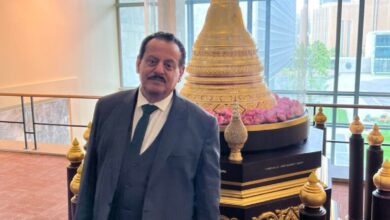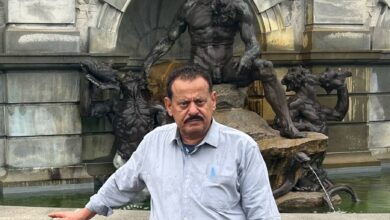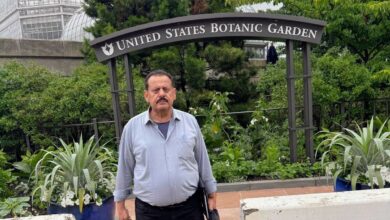Hunger and Shame

Yemeni mp
Ahmed Saif Hashed
In our days, we lived with hunger, grappling with our fates, able to snatch life from the claws of death by hunger. Today, however, a people dies every day, besieged by all sorts of filth, mafias, and waste. Death is both absurd and lavish in a world ravaged by tyrants, the gluttonous, and the trivial. It is a world complicit in our destruction through a war that has become grotesquely savage, with hellish shepherds who refuse to halt it or lay down their burdens. A cruel siege tightens with both hands, pressing with all its might on the mouths of those who have escaped death or remain alive. This war has become profitable, drowning its perpetrators in wealth and abundance as they convert our blood, hunger, famines, and immense tragedies into bank accounts.
* * *
I have often been hungry, wrestling with want, need, and deprivation. I suffered from emaciation, weakness, and the exhausting hardship that wears down both body and soul. I lived through long years of malnutrition, “anemia,” thyroid issues, painful swellings in my feet, as well as amoebic and giardial infections, and bouts of fever that would seize me from time to time.
When the fever struck, my body would revel in the warmth, enjoying the sun’s rays for longer, wishing for the heat to intensify. Yet, as soon as I felt its grip loosen, I discovered that the fever surged and intensified, growing stronger against my frail and weakened body. The “sun of the dead,” as we call it in our village, bidding us farewell with its reddening and fading light as it withers toward sunset, reminded me of my deteriorating health and my departed sisters, Noor and Samiyah.
During my time in the middle school at “Tor Al-Baha’a,” the prescribed meals were never enough; they barely satisfied my hunger. I continued to live a life of hardship and exhaustion, spending most of my days in a bitter struggle, desperately clinging to survival amid great suffering.
My mother would comfort me with small amounts of money that she gathered with great difficulty, trying to alleviate my hunger and sustain my will to live—for me and for her—while the future remained shrouded in uncertainty.
* * *
I became a guest during one of the annual vacations when I was in the first or second year of middle school, staying with a relative in Aden. I believe my trip to Aden was for treatment of a thyroid issue; a German doctor at Al-Nasr Hospital diagnosed my condition. I spent some time in the hospital—how long I can’t quite recall, perhaps around two weeks.
The hospital food brought to me was varied, delicious, and nutritious, without lines, scrutiny, or shame. Meals arrived at my bedside promptly and at the scheduled times without delay. In the bed next to mine lay a mother with her child from Yafea, who treated me with warmth and kindness, filling the void in my life. The nurses exhibited great care and responsibility, while the German doctor was particularly attentive and aware of his duties. God bless the German doctors who were meticulous and present in many details at this hospital run by the Ministry of Interior. I left the hospital completely healed, feeling as strong as a horse. I then moved to stay for a while with our relative Abdulkarim Haza in Al-Qat’i neighborhood of “Crater.”
Typically, the main lunch at the family I stayed with consisted of rice, “Zenob” fish, “Sanonah,” and “Ushar”—a truly delectable meal by my standards. From that day to this, I have loved and craved this dish. The problem I faced was my overwhelming shyness, a modesty that gripped me to an incredible extent. I would eat only half of what I needed, and sometimes even much less.
In Aden, it was customary—at least in the family I was with—not to serve rice and fish all at once, to avoid throwing away any leftovers into the trash. It was a good practice, but on that day, I failed to grasp its significance and the wisdom behind it.
Once the food in my plate was finished, or even before I had fully consumed it, I would leave the table immediately, before additional servings of rice could be dished out from the pot beside us. I would depart as soon as I had devoured the initial serving, or sometimes even before finishing it, while they would continue to refill their plates multiple times, sometimes three or four. My embarrassment compelled me to leave without waiting or considering a second helping.
Due to my intense shyness, I would leave the table as soon as I had finished the first serving of rice. As for the fish, I would eat only a tiny amount, also governed by my deep-seated modesty. The portion of fish I consumed with each bite was no larger than a grain of corn, or half a date if I dared to be adventurous, despite its abundance. Most of my bites didn’t even include fish, while my true appetite, if unleashed, would surely demand more than just a meal of rice and fish with “Ushar.” Perhaps that repressed craving, stifled by my shyness, has made me love this meal even more and yearn for it with greater intensity to this day.
Abdulkarim Haza, the head of the household, noticed the overwhelming shyness and embarrassment evident in my hands, face, and demeanor. Instead of insisting that I cast aside my modesty when it came to food, he addressed the matter in a manner that was both ingenious and unexpected. Rather than pressuring me to eat more fish, he said, “Ahmad doesn’t like fish.” I feigned agreement with his statement, completely abstaining from the fish offered to me. For the following days, I cited this as my reason for not eating fish, effectively becoming a vegetarian at the table of fish.
When they cooked “Zarbiyan” meat, a delicious dish, just as I was about to reach for a morsel, he interjected, saying, “Ahmad doesn’t like Zarbiyan meat.” With a sense of shyness and embarrassment, I replied, “Yes, I don’t like Zarbiyan meat.” Under the influence of his words, I deliberately deprived myself of the Zarbiyan, despite its enticing aroma that teased my senses, sharpening my appetite and stirring my innermost cravings in silence.
This pattern didn’t stop there; it continued with chicken as well. Just before I could reach for it, he said, “Ahmed doesn’t eat chicken.” I feigned agreement with a forced smile, falsely testifying to my own distaste for chicken.
The next day, before I could extend my hand toward lunch, he remarked, “Ahmed doesn’t like rice, Sanonah, or Ushar.” At that moment, I felt cornered by my shyness and embarrassment, pushed toward an impossible choice I couldn’t possibly uphold. The others erupted in laughter, as if they had been expecting this moment from what he had said. I sensed that his intention was to encourage me to shed my shyness and retain what was reasonable and manageable.
This time, I responded with a decisive tone, albeit with a smile:
— I like everything.
* * *
During my time at the middle school in “Proletariat” High School, there were many students in the dormitory, leading to long lines for dinner and lunch. Sometimes, dinner would run out before I could reach it, and other times, I would barely manage to get a small portion just as it was about to finish.
I was consumed by a shyness that prevented me from pushing my way forward. My sense of ethics also held me back from bypassing those in line ahead of me, no matter how intense my hunger grew, or how much I felt I might miss out on my designated meal. Meanwhile, many behind me in the queue would boldly cut in line, leaving me gradually at the end without dinner. I would reach the serving window only to find that dinner had run out, and perhaps by some stroke of luck, I would manage to secure the barest minimum.
Sometimes, due to my embarrassment, I would go to bed without dinner, or I would accompany my friend Mohammed Abdulmalik Hussein to the “Daiman” trees that bordered the school grounds, where we would pick unripe fruits that had yet to mature. Hunger sometimes pressed us so hard that we felt compelled to do this, not allowing the fruits to ripen. Our hunger was like a blade, swift in its harvest, while the trees clung to their unripe bounty, their branches constricting our throats choked by hunger. I had lost my mother’s support due to the distance and prolonged absence.
At times, I would sneak out with others under the cover of night to the distant farm to gather a handful of sesame seeds, and we would sometimes detour to the lemon trees, plucking a few fruits to eat with their peels or to enhance our meals, improving the flavor of the poorly cooked beans.
* * *






